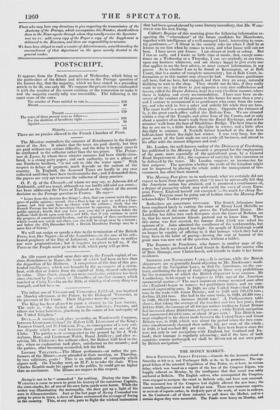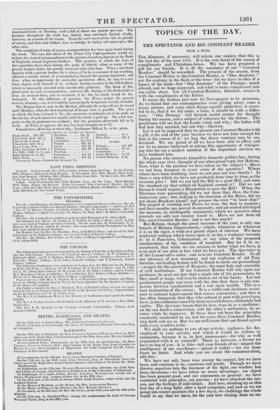THE MONEY MARKET.
STOCK EXCHANGE, FRIDAY EYENING.—Consols for the Account closed on Saturday at 84t to t, and Exchequer Bills at 0.9. to 7s. premium. The sup- posed failure of the intended Expedition of Don Pedro, or, at least, its serious delay, which was based on a report of the loss of the Congress frigate, was happily relieved on Monday, by the intelligence that that vessel was safely anchored at Eelleisle. The English sailors, who accompanied the Congress, were engaged to navigate the vessel to Belleisle only, and have now returned. The rumoured loss of the Congress had slightly affected the new loan; the correct intelligence raised it one half per cent. There were numerous reports, or revivals of reports rather, in the learly part of the week, of wars in embryo, on the Continent—all of them intended to pull down the Market, and to a certain degree they were successful. The Funds were heavy on Monday, and continued heavy on Tuesday, with a fall of about one quarter per cent. The business throughout the week has, indeed, been extremely limited, chiefly, however, on account of the season. Even the auri sacra fames has its periods of satiety, and Jews and Jobbers love to indulge in tnrkey and mince-pies, like other men.
The complaint of want of money accommodation has been again heard during the week. The very able editor of the Times City Correspondence would at- tribute the want of accommodation to the practice of making deposits at the Bank of England, instead of private bankers. This practice, to which the fears of the capitalists drove them during the panic of 1825-6, when so many of the private bankers failed, has greatly increased since that time. When a merchant deposits with a private banker, he is always, if he be a customer of any standing, allowed a certain extent of accommodation beyond the amount deposited ; and thus, when an opportunity for successful speculation offers, he may to a cer- taine degree avail himself of it, without having recourse to the bill-brokers, which is necessarily attended with considerable publicity. The Bank of En- gland gives no such accommodation ; and were Mr. Baring or Mr. Rothschild to keep an account there, and to overdraw it by 10s. his check would be dis- honoured. To this difference of practice, the Time assigns the present scarcity of money,—or, as it would be more properly designated, scarcity of credit. The Belgian loan is now in the Market, although the scrip will not be issued until Monday, when the first instalment of 15 per cent, is payable. The price at which the loan is issued is 75; the successive instalments are to be made on the 1st day of each successive month until the whole is paid up. On a few bar- gains to-day 21 premium was realized ; but the premium afterwards fell to 11 to 'IL At Paris, it appears, the loan has been brought out at 77.
Consols leave off to-day at 84 to 84i. ; Exchequer Bills at 7s. to 8s. prem.
CLOSING PRICES OF STOCKS ON FRIDAY.
Bank Stock . 192 193 Brazilian 431 41 Spanish 14 3 per Cent. Red. 82i I thilian 17 18 Ditto New 131 3 per Cent. Consuls — Colombian 111 121 Consols for Acct. 84 * Danish 651 6+
31 per Cent. New — Greek 22 3 Bolanos 140 150 Long Annuities 16 9-16 g Mexican 35/ 36 Brazilian 43 44 Ex. Bills, 1000/. 7s. 8s. pm. Peruvian — — Columbian India Bonds 3s. ls. dis. Portuguese 481 9+ Anglo Mexican .. 14 - 15 India Stock - Russian 9Si 91 United Mexican. 5 51 SATURDAY Noox.—Consols for Account, 84.
EAST INDIA SHIPPING.
Arrived. At Gravesend, Dec. 27th, Courier. Palmer, from the Cape. In the Downs, 29th, Minerva, Robertson, from Bengal. At Liverpool, Dec. 26th, Bounty Hall, Jack- son, from Bengal. Off ditto, 29th, Hindoo, Pindar, from ditto. In the Clyde, Dee. 26th, Terra Nova, Kelso, from Mauritius.
Sailed. From Portsmouth, Dee. 27th, Reform. Case, for the Cape. From Bristol, 28th, Eliza, Dixon, for Batavia. From Liverpool, 28th, Cervantes, Hughes, for the Cos.; 29th, Sir J.B tie Reid, lIaig, for Calcutta ; Huron, Hardy, for BombaY ; and Mary Ann, Mitchell, ibr New South Wales.
BM/RES.



















































 Previous page
Previous page